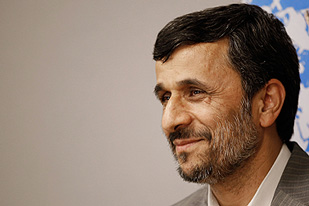Mahmoud Ahmadinejad, the Iranian president, has said that talks over his country's nuclear programme will be postponed until late August.
The current talks involve Tehran and the so-called "P5+1" countries - the five permanent members of the UN Security Council, plus Germany.
Ahmadinejad also called for new negotiating partners and said more countries should be involved.
Speaking at a news conference on Monday, the president said the negotiators should be asked whether they support Israel's right to nuclear weapons.
"They should declare their opinion about the nuclear bombs of the Zionist regime," he said.
"[And] they should declare what they are seeking through talks with Iran. Do they want to befriend us or do they seek enmity?"
Ahmadinejad did not specify which other countries should be involved.
He described the delay as "punishment" for a new round of economic sanctions against Iran approved earlier this month.
'Sooner, the better'
PJ Crowley, the US state department spokesman, said that the US is still interested in negotiations with Iran, and that Tehran should agree to resume talks - "the sooner, the better".
"If Iran's nuclear program is peaceful, then they should come forward and prove it," Crowley said. "They have consistently failed to convince the international community."
John Large, an independent nuclear consultant, said the delayed talks would worry Western governments, especially following Iran's recent decision to bar two International Atomic Energy Agency inspectors from entering the country.
"If it stays out of talks, if it stays out of communication like this, and of course it will stop the IAEA inspectors ... it keeps, if you like, the international community in the dark about what's going on now, and in the next quarter," Large told Al Jazeera.
Leon Panetta, the director of the US Central Intelligence Agency, said on Sunday that Iran has the capacity to produce a nuclear weapon within two years. But he stopped short of saying that Iran had decided to pursue such a policy. Iran insists its nuclear program is for peaceful purposes.
Sanctions dismissed
Many of the questions at the news conference dealt with Iran's economy.
Ahmadinejad dismissed the impact of recent new economic sanctions against his country - those passed by the United Nations Security Council, and separate sanctions packages approved by the European Union and the US congress.
"For 30 years, we have not had economic relations with the US," Ahmadinejad said. "[So] who are they sanctioning?"
Ahmadinejad also rejected a reporter's suggestion that low oil prices would impact the Iranian government's budget.
Nearly 60 per cent of the budget comes from oil and gas revenues, and the current budget was designed around an average price of $65 per barrel.
"If it goes below, then the production of oil is not going to be economical," Ahmadinejad said.
"But when it comes to the management of the country's affairs ... we can still run the affairs of the country."
Few analysts expect oil prices to dip below the $65 mark this year.
PHOTO CAPTION
Mahmoud Ahmadinejad, the Iranian president
Al-Jazeera


 Home
Home Discover Islam
Discover Islam Quran Recitations
Quran Recitations Lectures
Lectures
 Fatwa
Fatwa Articles
Articles Fiqh
Fiqh E-Books
E-Books Boys & Girls
Boys & Girls  Ramadan
Ramadan Fatwa Audios
Fatwa Audios Month of Mercy
Month of Mercy Women
Women Eed Al- Fitr
Eed Al- Fitr Food Recipes
Food Recipes Videos
Videos

 Prayer Times
Prayer Times












